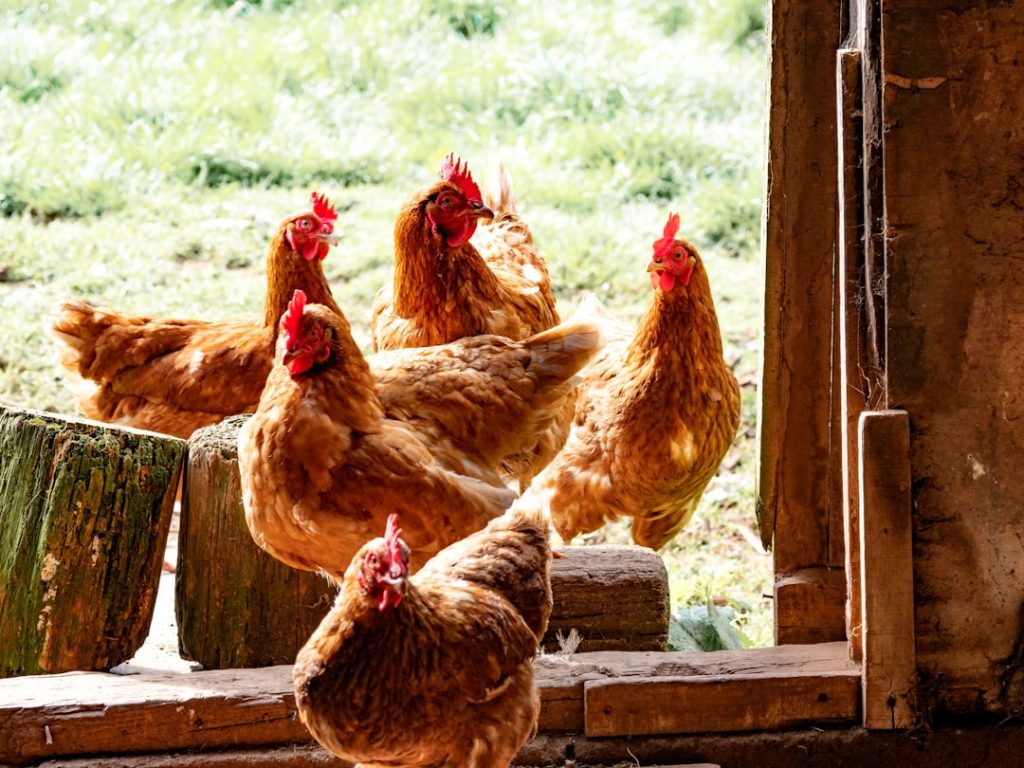In recent years, there has been a growing trend of backyard chicken keeping. Many people are discovering the joys of raising their own chickens for eggs and meat. However, like any hobby or lifestyle choice, there are both pros and cons to keeping chickens.
One of the main benefits of keeping chickens is the access to fresh eggs and meat. Fresh eggs are not only delicious, but they are also more nutritious than store-bought eggs. They are higher in vitamins and minerals, and they have been shown to have lower levels of cholesterol and saturated fat. Similarly, raising chickens for meat allows you to have control over the quality of the meat you consume. You can ensure that your chickens are raised in a humane and healthy environment, without the use of antibiotics or hormones.
Another advantage of keeping chickens is that it can be a sustainable and eco-friendly choice. Chickens are natural recyclers, as they eat kitchen scraps and turn them into nutrient-rich manure. This can be used to fertilize your garden, reducing the need for chemical fertilizers. Additionally, chickens can help control pests in your yard, such as slugs and snails.
However, there are also drawbacks to keeping chickens. One of the main challenges is the initial cost of setting up a coop and purchasing supplies. Building a coop can be expensive, especially if you want to include features such as insulation or automatic doors. Additionally, buying feed and other supplies can add up over time. However, it is possible to save money by repurposing materials or buying in bulk.
Key Takeaways
- Keeping chickens has both pros and cons that should be considered before starting.
- Raising chickens can provide a sustainable source of eggs and meat for your household.
- The cost of keeping chickens includes building a coop, buying feed, and other supplies.
- Choosing the right breed of chicken is important for meeting your specific needs.
- Building and maintaining a clean and healthy chicken coop is crucial for the well-being of your chickens.
The Benefits of Raising Chickens for Eggs and Meat
One of the main benefits of raising chickens for eggs and meat is the nutritional value of these products. Fresh eggs are packed with essential nutrients such as protein, vitamins A, D, E, and B12, as well as minerals like iron and selenium. They are also a good source of healthy fats, including omega-3 fatty acids. Similarly, chicken meat is a lean source of protein that is low in saturated fat and high in essential amino acids.
In addition to the nutritional benefits, raising chickens can also be a sustainable and eco-friendly choice. By raising your own chickens, you can ensure that they are raised in a humane and healthy environment. You have control over what they eat and how they are treated, which can result in higher quality eggs and meat. This can also reduce your carbon footprint, as you are not relying on factory-farmed products that contribute to deforestation and pollution.
On a personal level, raising chickens can bring a lot of joy and satisfaction. There is something incredibly rewarding about collecting fresh eggs from your own backyard. It is a tangible reminder of the hard work and care that goes into raising animals for food. Similarly, raising chickens for meat can be a fulfilling experience. Many people find solace in knowing exactly where their food comes from and how it was raised.
The Cost of Keeping Chickens: Coop, Feed, and Supplies
While there are many benefits to keeping chickens, there are also costs involved. One of the main expenses is building or buying a coop. The cost of a coop can vary greatly depending on the size and features you choose. A basic coop can cost anywhere from $200 to $500, while more elaborate designs can cost upwards of $1000. However, it is possible to save money by building your own coop using repurposed materials or purchasing a pre-made coop.
Another ongoing expense is feed. Chickens require a balanced diet that includes grains, protein, vitamins, and minerals. The cost of feed can vary depending on the type and quality you choose. On average, it costs about $20 to $30 per month to feed a small flock of chickens. However, you can save money by buying feed in bulk or growing your own grains and vegetables to supplement their diet.
In addition to the coop and feed, there are also other supplies you will need, such as bedding, waterers, and feeders. These can add up over time, but they are a necessary investment to ensure the health and well-being of your chickens. It is possible to save money by repurposing materials or buying used supplies.
While there are upfront costs involved in keeping chickens, there are also long-term financial benefits. By raising your own eggs and meat, you can save money on grocery bills. The cost of eggs and chicken meat can add up over time, especially if you prefer to buy organic or free-range products. By raising your own chickens, you can have access to high-quality eggs and meat at a fraction of the cost.
Choosing the Right Chicken Breed for Your Needs
When it comes to choosing the right chicken breed for your needs, there are several factors to consider. One of the main considerations is egg production. If you are primarily interested in raising chickens for eggs, you will want to choose a breed that is known for its high egg production. Some popular breeds for egg-laying include Leghorns, Rhode Island Reds, and Sussex.
Another factor to consider is meat quality. If you are interested in raising chickens for meat, you will want to choose a breed that is known for its meat quality. Some popular meat breeds include Cornish Cross, Freedom Rangers, and Jersey Giants. These breeds are known for their fast growth rate and flavorful meat.
Temperament is another important consideration when choosing a chicken breed. Some breeds are more docile and friendly, while others can be more flighty or aggressive. If you have children or pets, you may want to choose a breed that is known for being calm and gentle. Some popular breeds for families include Orpingtons, Silkies, and Australorps.
It is also important to consider the climate and environment in which you live. Some breeds are better suited to cold climates, while others are more heat-tolerant. If you live in an area with extreme temperatures, you will want to choose a breed that can withstand these conditions. Some popular cold-hardy breeds include Plymouth Rocks, Wyandottes, and Brahmas.
When choosing a chicken breed, it can be helpful to talk to other chicken keepers in your area or do research online. Personal experiences and recommendations can provide valuable insights into the characteristics and suitability of different breeds.
How to Build a Chicken Coop: Tips and Tricks
Building a chicken coop can be a fun and rewarding project. It allows you to customize the coop to fit your specific needs and preferences. Here are some tips and tricks for building a basic chicken coop:
1. Start with a plan: Before you begin building, it is important to have a clear plan in mind. Consider the size of your flock, the space available in your yard, and any specific features you want to include in your coop. This will help you determine the materials and dimensions you will need.
2. Choose the right location: The location of your coop is important for the health and safety of your chickens. It should be well-drained, protected from predators, and receive adequate sunlight. It should also be easily accessible for cleaning and maintenance.
3. Use quality materials: When building a coop, it is important to use quality materials that are durable and weather-resistant. This will ensure that your coop lasts for many years and provides a safe and comfortable environment for your chickens.
4. Provide adequate ventilation: Proper ventilation is essential for the health of your chickens. It helps remove moisture, ammonia, and odors from the coop, reducing the risk of respiratory issues. Make sure to include windows or vents that can be opened or closed as needed.
5. Include nesting boxes and roosts: Nesting boxes provide a comfortable and private space for your hens to lay their eggs. They should be filled with clean bedding, such as straw or wood shavings. Roosts provide a place for your chickens to perch and sleep. They should be placed higher than the nesting boxes and made of a comfortable material, such as a wooden dowel.
6. Consider predator-proofing: Predators can pose a threat to your chickens, so it is important to take steps to protect them. This can include burying wire mesh around the perimeter of the coop, installing locks on doors and windows, and using hardware cloth instead of chicken wire.
7. Customize to fit your needs: Depending on your specific needs and preferences, you may want to customize your coop with additional features. This can include automatic doors, insulation, or a run for your chickens to exercise in.
Building a chicken coop can be a rewarding experience that allows you to create a safe and comfortable home for your chickens. It is important to take the time to plan and consider all the necessary features to ensure the health and well-being of your flock.
Maintaining a Clean and Healthy Chicken Coop

Maintaining a clean and healthy chicken coop is essential for the health and well-being of your chickens. A clean coop helps prevent the spread of disease, reduces odors, and provides a comfortable environment for your chickens. Here are some tips for keeping your coop clean:
1. Regularly remove droppings: Chicken droppings can quickly accumulate in the coop, leading to odors and potential health issues. It is important to regularly remove droppings from the coop using a shovel or rake. You can compost the droppings or use them as fertilizer in your garden.
2. Replace bedding regularly: Bedding should be replaced regularly to keep the coop clean and odor-free. The frequency of bedding replacement will depend on the size of your flock and the type of bedding you use. Some common bedding options include straw, wood shavings, or shredded paper.
3. Clean and disinfect the coop: It is important to periodically clean and disinfect the coop to prevent the spread of disease. This can be done using a mild detergent or a mixture of vinegar and water. Make sure to thoroughly rinse and dry the coop before adding fresh bedding.
4. Provide dust baths: Chickens naturally take dust baths to keep their feathers clean and free from parasites. You can provide a designated area in the coop or run for your chickens to take dust baths. This can be filled with sand, diatomaceous earth, or wood ash.
5. Check for pests: Regularly inspect the coop for signs of pests such as mites, lice, or rodents. These pests can cause health issues for your chickens and should be dealt with promptly. You can use natural remedies such as diatomaceous earth or essential oils to control pests.
6. Maintain proper ventilation: Proper ventilation is important for the health of your chickens and the cleanliness of the coop. It helps remove moisture, ammonia, and odors from the coop, reducing the risk of respiratory issues. Make sure that windows or vents are kept open or closed as needed.
7. Practice biosecurity: Biosecurity measures help prevent the introduction and spread of disease in your flock. This can include quarantining new birds before introducing them to your existing flock, limiting visitors to your coop, and practicing good hygiene when handling chickens or their eggs.
By following these tips, you can maintain a clean and healthy coop that provides a safe and comfortable environment for your chickens.
The Daily Care of Chickens: Feeding, Watering, and Egg Collection
Caring for chickens on a daily basis involves several tasks, including feeding, watering, and egg collection. Here are some tips for each of these tasks:
1. Feeding: Chickens require a balanced diet that includes grains, protein, vitamins, and minerals. You can purchase commercial chicken feed that is specifically formulated for their nutritional needs. It is important to provide fresh feed daily and ensure that it is stored in a cool, dry place to prevent spoilage. In addition to commercial feed, you can also supplement their diet with kitchen scraps, fruits, vegetables, and grains.
2. Watering: Chickens require access to clean and fresh water at all times. It is important to provide them with a clean water source that is free from contaminants. You can use a waterer specifically designed for chickens or a shallow dish that is easy for them to drink from. Make sure to clean and refill the waterer regularly to prevent the growth of bacteria.
3. Egg collection: Collecting eggs from your chickens is one of the joys of keeping chickens. It is important to collect eggs daily to prevent them from becoming dirty or damaged. You can use a basket or egg carton to collect and store the eggs. Make sure to handle them gently to avoid cracking or breaking.
In addition to these daily tasks, it is also important to regularly check on the health and well-being of your chickens. This can include observing their behavior, checking for signs of illness or injury, and providing any necessary medical care.
Dealing with Common Chicken Health Issues
Chickens, like any other animals, can face health issues from time to time. It is important to be aware of common health issues and know how to prevent and treat them. Here are some common chicken health issues and tips for dealing with them:
1. Respiratory issues: Chickens can be prone to respiratory issues such as colds or respiratory infections. These can be caused by poor ventilation, damp conditions, or exposure to drafts. To prevent respiratory issues, make sure your coop is well-ventilated and free from drafts. If your chickens do develop respiratory symptoms, such as coughing or sneezing, it is important to isolate them from the rest of the flock and seek veterinary advice.
2. Parasites: Chickens can be affected by external parasites such as mites, lice, or fleas. These parasites can cause itching, feather loss, and general discomfort for your chickens. To prevent parasites, regularly inspect your chickens for signs of infestation and treat them with appropriate remedies. This can include dusting them with diatomaceous earth or using natural pest control products.
3. Egg-related issues: Chickens can sometimes experience egg-related issues such as egg binding or egg peritonitis. Egg binding occurs when an egg becomes stuck in the hen’s reproductive tract, while egg peritonitis is an infection of the abdominal cavity caused by a ruptured egg. To prevent these issues, make sure your hens have access to a balanced diet and plenty of calcium. If you notice any signs of egg-related issues, such as lethargy or swelling in the abdomen, it is important to seek veterinary advice.
4. Coccidiosis: Coccidiosis is a common intestinal disease that can affect chickens, especially young birds. It is caused by a parasite called coccidia and can cause diarrhea, weight loss, and general weakness. To prevent coccidiosis, make sure your coop is clean and dry, and provide clean bedding regularly. You can also consider using a coccidiostat medication in the feed or water to help prevent the disease. It is important to practice good hygiene and sanitation measures to minimize the risk of coccidiosis in your flock. Additionally, providing a balanced diet and ensuring that chickens have access to clean water at all times can help boost their immune system and reduce the likelihood of infection. Regular monitoring and observation of your chickens’ health can also help detect any signs of coccidiosis early on, allowing for prompt treatment if necessary.
If you’re considering keeping chickens, you might also be interested in learning about the benefits of keeping geese. Geese can be a great addition to your backyard flock, and they have unique dietary needs. To find out if geese can eat chicken feed and what other foods they require, check out this informative article on poultrywizard.com. Additionally, if you’re looking for tips on creating a garden chicken coop or even renting a chicken coop, poultrywizard.com has got you covered with these helpful articles: Garden Chicken Coop and Rent a Chicken Coop. Happy chicken (and goose) keeping!
FAQs
What are the benefits of keeping chickens?
Keeping chickens can provide a source of fresh eggs, fertilizer for gardens, and entertainment. They can also help control pests in the yard and provide a sense of self-sufficiency.
What are the costs associated with keeping chickens?
The costs of keeping chickens include purchasing or building a coop, buying feed and bedding, and providing veterinary care. There may also be costs associated with city permits or zoning regulations.
What are the risks of keeping chickens?
Chickens can carry diseases such as salmonella, so it is important to practice good hygiene when handling them. They can also attract predators such as raccoons and foxes, so it is important to secure their coop and run.
How much space do chickens need?
Chickens need at least 4 square feet of indoor space per bird and at least 10 square feet of outdoor space per bird. It is important to provide enough space to prevent overcrowding and promote healthy living conditions.
What kind of care do chickens require?
Chickens require daily care, including feeding, watering, and cleaning their coop and run. They also need regular veterinary check-ups and may require treatment for parasites or illnesses.
Can chickens be kept in urban areas?
Many cities allow residents to keep a small number of chickens in their backyard, but it is important to check local zoning regulations and obtain any necessary permits. Chickens can be kept in urban areas as long as they are provided with adequate space and care.
Meet Walter, the feathered-friend fanatic of Florida! Nestled in the sunshine state, Walter struts through life with his feathered companions, clucking his way to happiness. With a coop that’s fancier than a five-star hotel, he’s the Don Juan of the chicken world. When he’s not teaching his hens to do the cha-cha, you’ll find him in a heated debate with his prized rooster, Sir Clucks-a-Lot. Walter’s poultry passion is no yolk; he’s the sunny-side-up guy you never knew you needed in your flock of friends!







